Articles about reggae music, reviews, interviews, reports and more...
Interview: Nereus Joseph
- Home
- Articles
- Interviews
- Interview: Nereus Joseph

Interview: Nereus Joseph
"People that want to hear strictly roots alone without one love song – that’s about two percent of reggae listeners!" Nereus Joseph talks to Angus Taylor on the set of his latest video Africa For Africans.
Nereus Joseph has recorded just six albums in a career that spans three decades. But in spite of this, or perhaps because of it, he remains one of Britain’s most respected roots reggae artists.
Moving to Britain from the island of St Lucia at a young age, he started singing in 1979 as part of Coptic Roots band, before signing to London’s seminal Fashion label in the ’80s. “Share Your Love” a collaboration with the group Passion brought Nereus into the UK charts in 1996 yet he has always remained true to his Rastafarian beliefs and artistic vision.
In recent years he has set up his own company, Sirius Records, with his friend and co-producer Kenny Edgehill. Based near the top of a high-rise concrete monolith in Poplar, East London, Sirius is a hub of recording activity for a diversity of home-grown reggae talent. Angus Taylor caught up with Nereus in Ilford just as he had finished shooting the video for “Africa For Africans”, the first single from his latest album Real Rebels Can’t Die (Sirius).
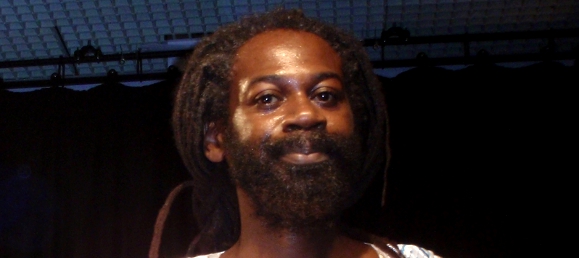
How was the video shoot for you?
Fantastic. Everybody worked well. I love the producer of the video because he was very persistent. He didn’t mind doing shots a few times. Hard working guy! The producer is a brother named Kirk. I know him through my publisher, Back To The Future Music, which is a guy named President. And we hooked up together because we thought it’s time, a new album, so these are things we need to be doing to support the production of the album. Loved the colours in the video as well. Very colourful video. It’s thing called Africa For Africans so you can imagine that colours that are going on there! I can’t wait to see it myself.
The concept of the video is an interesting one. Tell us about it.
It’s about a guy who lives in London, has an office job, and is very bored with his life. It’s very mundane, he gets up every day to go to work and he wishes so much that he was back in Africa. And he keeps having this vision of this beautiful African woman just appearing in front of him in various different places: on his way to work, getting up in the morning. And then she’s all of a sudden appeared in front of him and it’s like a man wishing to get back home. Which is very poignant in terms of what we’re trying to say.
Who came up with the script?
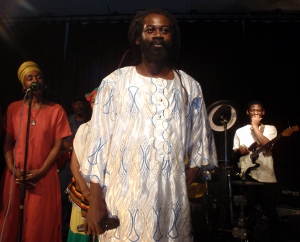 It was Kirk. That’s why we were so glad to use the company you know? Making videos in the past we’ve always had to rely on ourselves to work out how it’s going to look. But this guy came in so professionally and in the first meeting, after he listened to the music, he had the ideas in his mind for such a clear script and we liked the idea. Because with a track like “Africa For Africans,” the kind of locations it demands, the kind of budget it demands, just the title alone tells you you’ve got a touch of Africa or African people, something not in England. Which means automatically you’ve got to spend money. Kirk was still able to look at it in the right way and use things that we had amongst us and really did a good job. And that’s when you know a video producer can really do the work: when he can use what he’s got and still make it work.
It was Kirk. That’s why we were so glad to use the company you know? Making videos in the past we’ve always had to rely on ourselves to work out how it’s going to look. But this guy came in so professionally and in the first meeting, after he listened to the music, he had the ideas in his mind for such a clear script and we liked the idea. Because with a track like “Africa For Africans,” the kind of locations it demands, the kind of budget it demands, just the title alone tells you you’ve got a touch of Africa or African people, something not in England. Which means automatically you’ve got to spend money. Kirk was still able to look at it in the right way and use things that we had amongst us and really did a good job. And that’s when you know a video producer can really do the work: when he can use what he’s got and still make it work.
How did you find the dancer who played this vision?
She was fantastic! She looked like one of those gracious statues of a black woman. Really royal. She danced really gracefully. I’ve known her a while and I knew she danced and I’ve seen her dance different versions. But now she was asked to dance an African dance and it just blew me away because the movements she was incorporating was just fantastic. She’s a dancer but she’s a roots dancer. A conscious dancer. Not a go-go dancer (laughs)!
What was the best moment?
I’d say the crowd scenes. The crowd – having loads of different people, young, old, the dancers. All of it was fun really. I mean the last day shooting we were laughing all day long. We were just having a great time. But I’d say the crowd scene. It was big!
And what was the most difficult moment?
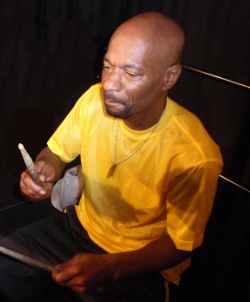 (Laughs) The most difficult moment for me was to transform myself into ‘an actor!’ Because there was a lot of acting going on. Mostly OVER-acting I was told! (Laughing) I did graduate with an O Level in performing arts from school so I tried! I did some drama at school, you know, nativity plays and stuff like that you know? But this video shoot had so much acting in it, because we had a really structured script - from waking up in the morning to getting out of bed to ironing my clothes, driving to work, reaching the office – it was all expressions - and plus I had Mama Earth following me everywhere that I was going mystically – so it was a lot of reactions and actions. But I liked it so who knows I might take some classes and really try for it (laughs)!
(Laughs) The most difficult moment for me was to transform myself into ‘an actor!’ Because there was a lot of acting going on. Mostly OVER-acting I was told! (Laughing) I did graduate with an O Level in performing arts from school so I tried! I did some drama at school, you know, nativity plays and stuff like that you know? But this video shoot had so much acting in it, because we had a really structured script - from waking up in the morning to getting out of bed to ironing my clothes, driving to work, reaching the office – it was all expressions - and plus I had Mama Earth following me everywhere that I was going mystically – so it was a lot of reactions and actions. But I liked it so who knows I might take some classes and really try for it (laughs)!
“Africa For Africans” has a similar rhythm to the Chantells “Children Of Jah.” How did you and Kenny decide this rhythm would be right for the song?
(Laughs) It was never taken from Children Of Jah! It just happened to sound like it! Somebody else also heard it and said so. After hearing the comment I definitely agreed because I know the Chantells tune and I love the Chantells tune. But if you listen to it the drums are slightly different. Because “Children Of Jah” has got an off beat snare and ours is on. It’s like a one drop snare.
There’s a long established tradition of using classic rhythms so it’s not like we’re saying you stole the tune! But you say it just came out that way?
That’s right. We were just on a rockers mission! We wanted the rockers! We did a Dennis Alcapone rockers tune, “No Peace,” and a few of those things, and we thought ‘Well all right, we’re in the rockers mode’ and that’s how it came about.
Why did you decide this would be the first single?
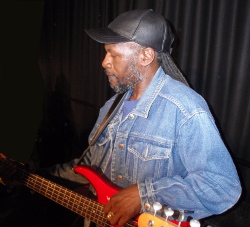 Well the tune had been playing in Africa for quite a while as part of the African promotion. And the excitement it was creating and the buzz that’s really coming off the tune you know? People really liked the tune. They were astonished and amazed at the tune. It’s not just ‘OK it’s a reggae tune.’ It’s a reggae tune with slight differences. The guitar is definitely not a reggae lead guitar. So it takes people by surprise.
Well the tune had been playing in Africa for quite a while as part of the African promotion. And the excitement it was creating and the buzz that’s really coming off the tune you know? People really liked the tune. They were astonished and amazed at the tune. It’s not just ‘OK it’s a reggae tune.’ It’s a reggae tune with slight differences. The guitar is definitely not a reggae lead guitar. So it takes people by surprise.
The guitar is a sort of highlife thing isn’t it?
That’s right. Definitely. We wanted to have an influence of African music and highlife music in it. So we got Alfred Bannerman, who’s a very well known guitarist, playing with Osibisa and different groups, to play on it. He is a magnificent astonishing guitarist.
Did you tell him what to play or did he come up with the lines?
In highlife there are a few different licks that are known to African musicians you know what I’m saying? So if you play in a certain way you’ll be playing a particular country’s way. Each country has their different type of guitaring works. So he gave us a guitaring work that we thought would suit for everything we did because we were calling all different countries in the song. He gave us a few different licks that would benefit those flavourings.
Were there other tunes from Real Rebels being considered?
To tell you the truth, without being bigheaded, I found it hard to choose a single from the album. Tracks that we thought may do well before we put out the album, are still doing well but other tracks are being played harder than we really thought. So it’s hard to work out what people really and what we should really go with. I don’t think we’ve got a weak track where we’d say ‘This is a more obvious track that we should be putting out first’ you know what I’m saying? I would personally have gone with either the Dennis Alcapone or the Benjamin Zephaniah combination.
The song has a pleasant tune but a serious message. Was this something you planned to get the message across?
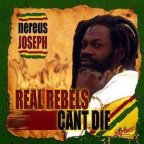 Yes, definitely. Because for years we’d been talking and this is one of the things that brought us to write such a tune as “Africa For Africans.” We’ve been talking of how we’d love black people who’ve left Africa and settled in Europe or America to look back to Africa and see what they can inject and just go back. Because a lot of people that leave Africa (or have been taken from Africa and brought to the Caribbean and now left the Caribbean and come to England) they don’t go back to Africa (or the Caribbean) for a long, long, long time. So the cry is really for them to come home and see what’s happening, even if it’s for a week, two weeks or just a short time, just to keep up to date with what’s happening in Africa. Because our problem as Africans is we don’t communicate as African nations as well as, say, the Americas communicate with each other. We need to be aware of what’s happening in Africa as African people. Black people: African people out of Africa, African people in the Caribbean, African people who are living in America – we all need to be aware of what’s going in Africa. And the way we can do that is not by what we listen to on the news - because more than 60 percent of that is very untrue – so we need to go back and check for ourselves and if there’s anything we can contribute we’ll see it for ourselves. We can’t get to the point where we can contribute something back to Africa unless we can see, with our own eyes, what section, what part we have to contribute to. Otherwise we’ll be unorganized people heading for the same thing, which is not really into Africa, just out of Africa. Because it seems like the glitter and light shines a little bit brighter out of Africa. What I’m trying to say is ‘It’s shining much brighter IN Africa’ and that’s where we should be looking to.
Yes, definitely. Because for years we’d been talking and this is one of the things that brought us to write such a tune as “Africa For Africans.” We’ve been talking of how we’d love black people who’ve left Africa and settled in Europe or America to look back to Africa and see what they can inject and just go back. Because a lot of people that leave Africa (or have been taken from Africa and brought to the Caribbean and now left the Caribbean and come to England) they don’t go back to Africa (or the Caribbean) for a long, long, long time. So the cry is really for them to come home and see what’s happening, even if it’s for a week, two weeks or just a short time, just to keep up to date with what’s happening in Africa. Because our problem as Africans is we don’t communicate as African nations as well as, say, the Americas communicate with each other. We need to be aware of what’s happening in Africa as African people. Black people: African people out of Africa, African people in the Caribbean, African people who are living in America – we all need to be aware of what’s going in Africa. And the way we can do that is not by what we listen to on the news - because more than 60 percent of that is very untrue – so we need to go back and check for ourselves and if there’s anything we can contribute we’ll see it for ourselves. We can’t get to the point where we can contribute something back to Africa unless we can see, with our own eyes, what section, what part we have to contribute to. Otherwise we’ll be unorganized people heading for the same thing, which is not really into Africa, just out of Africa. Because it seems like the glitter and light shines a little bit brighter out of Africa. What I’m trying to say is ‘It’s shining much brighter IN Africa’ and that’s where we should be looking to.
Give us an example of something we hear on the news about Africa that’s not true.
There’s been a lot of things going on in the media. For instance, Zimbabwe. One time they were saying that there were plagues and cholera and famine and those kinds of things in Zimbabwe. A brethren came back within the same period of time and we asked him ‘So what’s happening down there that hear on the news and that?’ He said, ‘Nothing like that! Nothing of the sort is going on’! They were talking like it was a state of emergency where people were quarantined in hospitals. He said he was there and it was like normal everyday stuff. There was no panic in the streets like they were saying on the news. He came back and was like ‘What was all the noise about’? You know? So we have to be there, you know? We have to be there.
Tell us about Little Ilford Youth Centre where the shoot took place.
That’s actually where I work. I am a tutor there and I teach Music Technology and I also teach sports: table tennis, football, badminton. And for the way the script was sounding it just sounded perfect to use it for that section. Because we have a big stage we use for performances that we could convert to make it look like we wanted, and then the office, obviously for the office scenes, and then my house because it was such a beautiful place (laughs)! So it’s a place of work and it was automatically looked at as a perfect spot. And they loved the idea, they love the encouragement that I give to the young people as far as music concerned so they do their best help out in as many ways as they can.
Can you go into more detail about your music work?
I teach Music Technology and Music Production. And there have been a few up and coming people that have left and gone on to do some good things. I teach them music; I teach them the foundation of sequencing, basslines, knowing how to use the technology, how it’s upgrading every minute and how things are moving - because it’s very important to keep upgrading and to know what’s going on technically. It’s very fulfilling because I get a chance to pass down my knowledge to real up and coming artists and some of them have got a real passion for the music. It’s mostly urban; you know grime, house and garage, hip-hop, and some reggae too. My eldest son is doing really well now, touring with Tincy Stryda and N Dubz. He was a graduate from that same centre and same production.
You started off playing roots music but a lot of your output after that was lovers. Are they two sides of the same coin?
Coptic Roots band was very rootical. Fashion Records was roots as well but it had a mixture you know what I’m saying? The lovers rock came into play as well as the roots. Guidance and those albums were very rootical as well as having a few love songs. But love songs has always been a part of reggae music because when I listen to my biggest artists like Dennis Brown and Freddie McGregor, they have the roots aspect and they still have the love aspect as well. I always regard a love song as part of reggae music and it’s reggae music that I deal with. Conscious reggae music. So that’s right, they’re the same thing because it’s always been so. Reggae music has been used to express words of love from the beginning. This is something that has always been going on. And also roots music, conscious lyrics. Reggae music is my form of entertainment and it gives me that conscious side and it gives me that relaxed sit at home and chill out side, which is very important. This is why a music like reggae has stood the test of time where so much music is no longer.
Why is it some fans of reggae seem to go one way or the other and don’t like both? I have friends that only like roots and friends who only like lovers.
I think it’s a myth. I think the people that want to hear strictly roots alone without one love song – that’s about two percent of reggae listeners! I think 98 percent of roots listeners would still listen to a lovers tune. I’m not talking about a soppy cheesy lovers rock tune but a well constructed song, they’d still listen. Yeah man! I think it’s a myth. You’d see some out and out hardcore roots people yeah? And imagine if you’d draw a John Holt upon them now? They’d still dance! They wouldn’t say ‘Aw! Take off that! We don’t want to hear that’! They’d say ‘Yeah man, John’! They’d appreciate it because they’re hearing instruments collaborating with each other. Not just a two chord or in some cases a one chord you know what I’m saying?
But would that work in reverse? Can the right kind of roots tune be dropped at a lovers rock night?
Definitely! You go a lovers rock big showcase now and you drop “Hard Times” (sings) ‘Do you really want to know,’ everybody goes crazy man and that’s a roots tune. It’s just about being a good selector. (Laughing) so you need a good selector to know how to draw the rhythm then. The art of selecting! There is a real art to it. You can’t just play any tune. Sometimes you’re sitting in your house and you play a tune and you thinking ‘yeah’! Because you’ve got the time and the quiet and the peace to listen to it. Then you play it to a crowd of people and they’re thinking ‘What are you doing’? There’s an art to it.
What were your best and worst video making experiences in your career?
The worst has got to be (pauses, thinking) well we can’t really say that! Every video has its bad time you you’re thinking ‘Hey, I’ve done the video. I want to see the finished thing now. What’s going on’? And then it’s ‘Technically this and technically that and the colour’. I think that’s the only part of it that I’m thinking ‘Hang on a minute - I wish I knew what was really going on.’ But this video we just did, Africa For Africans, just doing that video alone was the best thing that I knew about videos. That made making videos a good experience rather than bloody hard work! It made making a video a fun thing. Yeah man.
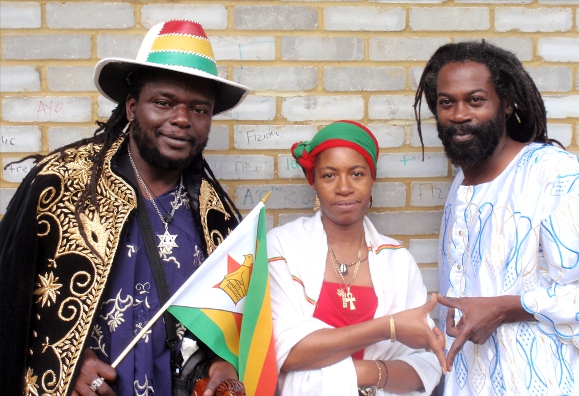
Afrikan Simba, Sister Joseph and Nereus at Little Ilford Youth Centre
Photos copyright Angus Taylor 2009
Reproduction without permission of United Reggae and Angus Taylor is prohibited.
Read more about this topic
Comments actually desactivated due to too much spams
Browse by categories
Recommended Articles
Latest articles
Recently addedView all
© 2007-2026 United Reggae. All Rights Reserved. Reproduction in whole or in part is prohibited. Read about copyright
Terms of use | About us | Contact us | Authors | Newsletter | A-Z














